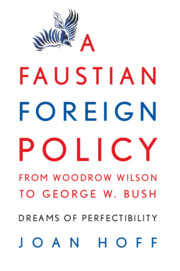Book contents
- Frontmatter
- Contents
- Introduction: Toward a Faustian Diplomacy
- 1 The United States Forms and Refines Its Diplomacy
- 2 The Faustian Impact of World War I on U.S. Diplomacy
- 3 The Faustian Aspects of Prosperity, Depression, and War
- 4 Faustian Aspects of U.S. Cold War Foreign Policy
- 5 Cold War Transformation of the American Presidency
- 6 The United States Adrift in the Post–Cold War World
- 7 Flaunting Faustian Foreign Policy
- Epilogue: The Legacy of George W. Bush
- Notes
- Bibliography
- Index
1 - The United States Forms and Refines Its Diplomacy
Published online by Cambridge University Press: 18 August 2009
- Frontmatter
- Contents
- Introduction: Toward a Faustian Diplomacy
- 1 The United States Forms and Refines Its Diplomacy
- 2 The Faustian Impact of World War I on U.S. Diplomacy
- 3 The Faustian Aspects of Prosperity, Depression, and War
- 4 Faustian Aspects of U.S. Cold War Foreign Policy
- 5 Cold War Transformation of the American Presidency
- 6 The United States Adrift in the Post–Cold War World
- 7 Flaunting Faustian Foreign Policy
- Epilogue: The Legacy of George W. Bush
- Notes
- Bibliography
- Index
Summary
America, in the assembly of nations, since her admission among them, … has uniformly spoken though often to heedless and often to disdainful ears, the language of equal liberty, of equal justice, and of equal rights. [But] she has abstained from interference in the concerns of others, even when the conflict has been for principles to which she clings.
John Adams, July 4, 1821Of all the diplomatic concepts associated with American exceptionalism and Wilsonianism, self-determination emerged as the most important and long-lasting. It can be said that the United States was born in an absent-minded fit of self-determination during the American Revolution, because British colonists in the New World did not start out demanding independence, let alone democracy. Rather, they claimed “for themselves the rights and liberties of Englishmen.” However, once push came to shove and independence based on self-determination became the driving force behind the American Revolution, the country quietly nourished and groomed this autonomous brand of nationhood for itself and, for most of the nineteenth century, touted it to other emerging nations that found themselves in civil turmoil.
Self-determined, but not necessarily democratic, self-government became the symbolic and mythological hallmark of the origins of the United States and lay at the heart of its perception of itself as exceptional and its drive to become the example for how the rest of world should operate.
- Type
- Chapter
- Information
- A Faustian Foreign Policy from Woodrow Wilson to George W. BushDreams of Perfectibility, pp. 22 - 44Publisher: Cambridge University PressPrint publication year: 2007



